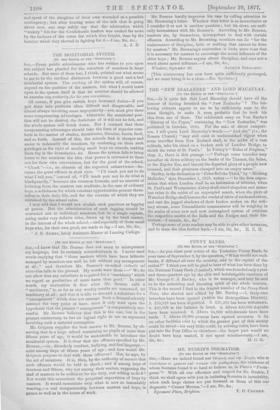THE MONITORIAL SYSTEM.
Lfro THE EDITOR OF THE "SPEOTATOR."]
Sin,—Eyery public schoolmaster who has written to you upon this subject has pleaded for the retention of monitors in large schools. But none of them has, I think, pointed out what seems to me to be the cardinal distinction between a good and a bad monitorial system. The working of the system will, of course, depend on the qualities of the masters, but what I would insist upon in the system itself is that no monitor should be allowed to exercise any authority for his own convenience.
Of course, if you give certain boys increased duties—if you put them into positions often difficult and disagreeable, and almost always involving some unpopularity—you must give them some compensating advantages. Otherwise the monitorial posi- tion will not be desired, the forfeiture of it will not be felt, and the whole system will break down. But I contend that these compensating advantages should take the form of superior com- forts in the matter of studies, dormitories, libraries, hours, food, and so forth. Instead of this, the schools find it cheaper and easier to indemnify the monitors, by conferring on them such privileges as the right of sending small boys on errands, making them fag in the dormitories, &c. Hence the system fails to bring home to the monitors the idea that power is entrusted to them not for their own convenience, but for the good of the school. " Cheek "—i.e., an absence of the expected subservience—be- comes the great offence in their eyes. "Ill teach you not to do what I tell you," instead of, "I'll teach you not to do what is blackguardly," becomes the common formula, and no amount of lecturing from the masters can eradicate, in the case of ordinary boys, a selfishness for which constant opportunities present them- selves in their daily life, and for the exercise of which they are sustained by the school rules.
I may add that I would not abolish such practices as fagging at games. But the administration of such fagging should be entrusted not to individual monitors, but to a single captain, acting under very definite rules, drawn up by the head master, in the interest of the whole school,—and especially of those small boys who, for their own good, are made to fog.—I am, Sir, &c.,
J. E. SYMES, lately Assistant-Master at Lancing College.


































 Previous page
Previous page